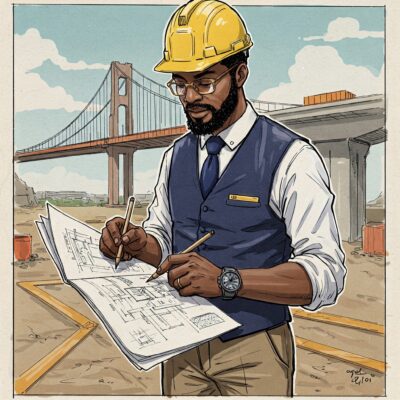Civil engineers design, construct, and maintain infrastructure projects such as roads, bridges, buildings, and water systems. They play a critical role in developing and sustaining modern society.
What is a typical day in Civil Engineering?
– Designing and planning construction projects
– Conducting site surveys and analyzing data
– Collaborating with architects, contractors, and government officials
– Ensuring projects meet safety and environmental standards
What else might they be expected to do?
– Supervise construction and monitor progress on-site
– Perform structural analysis and risk assessments
– Prepare cost estimates and project timelines
What type of training is needed for this career path?
– A Bachelor’s degree in Civil Engineering is required.
– Practical experience through internships or apprenticeships is essential.
– Advanced roles may require a Master’s degree or Chartered Engineer (CEng) status, aligning with the British education system.
What kind of personality is needed to excel in this career path?
– Strong analytical and problem-solving skills are critical.
– Comfortable working with numbers
– Big 5 traits: Conscientiousness and Openness are significant.
– Myers-Briggs types: ESTJ or ISTJ often align well with this field.
What kind of interests do people in this career path have?
– Passion for building and designing structures (Realistic and Investigative traits).
– Interest in sustainability and environmental impact
– Creating methods for interpreting data (Artistic)
– Interests & Aptitude: Realistic (R), Investigative (I), and Conventional (C)
Are there any innate skills or aptitudes required?
– Spatial awareness and the ability to visualize structures
– Strong numerical skills and technical knowledge
– Attention to detail
What challenges can I expect to face if I pursue this career path?
– Meeting tight deadlines and budgets
– Adapting to unexpected site conditions or project changes
– Managing communication between diverse stakeholders
What are the job prospects for this path in Kenya and Africa? What about International prospects for a Kenyan citizen?
– Kenya and Africa: There is high demand for civil engineers to support urbanization and infrastructure development. Opportunities are abundant in construction, water management, and transportation sectors.
– International: Kenyan civil engineers with internationally recognized qualifications can access opportunities in countries like the UK, Canada, and Australia, which frequently recruit skilled professionals.
What should I focus on if I choose to pursue this career?
– Build strong foundations in physics and mathematics.
– Develop proficiency in design tools like AutoCAD and Revit.
– Gain practical experience through internships or construction projects.
Which other careers or job roles can I progress to?
– Structural Engineer
– Project Manager
– Urban Planner
– Environmental Engineer
– Construction Manager

